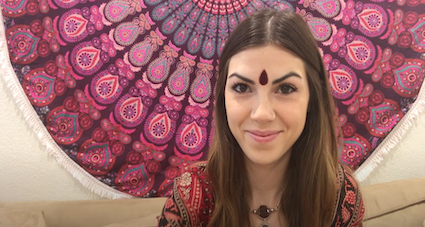India has been primarily Hindu in culture and religion for many centuries, extending to thousands of years. Hinduism has endured remarkably through long periods of foreign invasion and hostile rule, though other ancient religions have long since perished.
Yet, mocking Hindus and their Dharmic traditions such as Murti puja or Ayurveda have become a new style statement for many. People often intentionally disregard the ideals of the Dharmic way of living as they consider making fun of Hinduism is much easier than mocking gods and prophets from other religions, say, Islam and Christianity.
Beyond that, critical issues like the ‘caste system’ are shown as an enduring and endemic aspect of only Hindu culture, while the truth is all religions identify with caste. Muslims do it; Christians do it; so do Sikhs- Punjab has recently got a ‘Dalit-Sikh Chief Minister.
Ma Nithya Prasiddhananda, otherwise known as the Kundalini Yogini, a Yoga Acharya and Ayurvedic Practitioner from Los Angeles, California, argues how there is a suppression of Dharmic traditions and cultures majorly associated with Hinduism by the Western countries.
In one of her interviews (below), she had mentioned that the Western influence, which primarily wanted to colonize India, destroyed the country from inside.
“India had such strong civilization and much-advanced education system, but later Portuguese, Britisher, and Mughal invaded the country after so much intentional destruction, creation of caste system to twist Indians against Indians, and destruction of education system including gurukuls which totally slandered the culture of the nation.”
She points out that while social stratification existed since pre-colonial India, it was mainly the practices of Britishers that created a false definition and conception of the caste system because if we turn our attention to our Vedic literature, there are numerous instances of ‘Shudras’ and ‘Vaishyas’ who became kings; merchants and soldiers and nomads who were caste-less; large numbers of farmers who were also soldiers; and Brahmans who were farmers, soldiers, traders, or even kings One’s caste could be changed as easily as moving from one village to another. And such instances were not exceptions; they happened frequently.
She further argued that while people think the practice of denouncing a particular tradition happened a long ago, the truth is it still prevails.
“You can look anywhere to see how much propaganda is spread to embarrass, humiliate, and make people question their own faith in Hinduism,” she mentioned.
There are numerous cases where Hindu gods have been mocked, including in movies like PK, Oh My God, and even in the direct education system.
She also called out the prevalent Hinduphobia in Western academia and points out how people like Max Muller, who still have colonisers’ ideology, have intentionally presented incorrect facts about Hinduism. Despite knowing this, people are studying them and sadly considering it incredible!
The country’s people whose Constitution has the word Secular as its main feature, often blurs the line between secularism and selectivism. Seeking Muslim votes by appealing to the Imam of Jama Masjid is considered a smart move but appealing to Hindu seers is communal. Speaking up for minority rights is noble but speaking up for Kashmir’s abandoned Pandits is not.
It must be noted that people around the world, especially in the Indian sphere, should acknowledge the fact that the Hindu dharma is not a dogma and is not prone to the dangerous aspects of fundamentalist, evangelical or purely faith-based orthodoxy; instead, Hindu pluralism and multiculturalism is pacifistic.
The Hindu dharma represents the world’s most ancient, continuously practised, indigenous spiritual and philosophical tradition, which focuses on inner knowledge over outer belief and finds its basis in timeless truths and natural law.
(This piece is courtesy citti.net).


